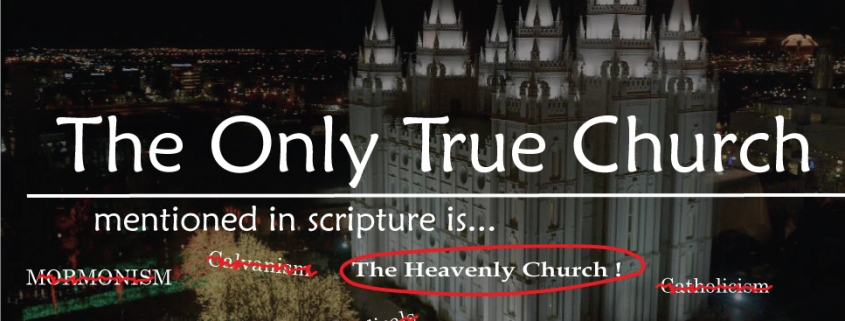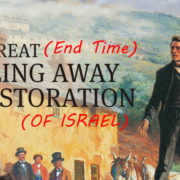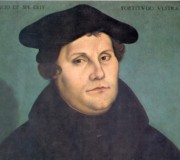Re-examining what the scriptures say about the “Only True Church” Doctrine
.
The Temporal Church as a Copy or ‘Type’ of the Spiritual Church
In the revelations given to Joseph Smith in Doctrine and Covenants ten, the “trueness” of a temporal or denominational church appear to be dependant on how well it copies or aligns itself with the spiritual church as it exists in heaven. Apparently, when the Heavenly Church commits a dispensation or makes a covenant with a people, the leaders are given a charge or responsibility to be a type, copy or microcosm of that true spiritual church which exists in heaven— to be a “light” or example (Heb 8:5;9:23-24;10:1; Alma 13:16). As they succeed they can be classified as a “true and living” church or religion (meaning they are legitimate or approved by the church in heaven). The spiritual church in heaven influences sweeping social movements in every part of the earth. Within each dispensation, every good/true organization or church adds to Christ’s true spiritual church, but if they fail, they do the opposite. This point is explained to Joseph Smith in D&C 10, a revelation given in 1829 before the LDS church was even organized. Take note of the changing use of the word “church” and the distinctions that are made between the spiritual church, and the temporal or denominational copy Joseph is charged with establishing. Red text and parenthetical annotations are mine.
52 And now, behold, according to their [the Nephites] faith in their prayers will I bring this part of my gospel to the knowledge of my people. Behold, I do not bring it to destroy that which they have received, but to build it up.
53 And for this cause have I said: If this generation harden not their hearts, I will establish my church among them.
54 Now I do not say this to destroy my church, but I say this to build up my church;
(“my church” in v. 54 is obviously referring to his spiritual church, since the LDS temporal church was not yet organized, and would otherwise make no sense in this context. For instance, why would “establishing” his temporal church destroy his temporal church when it did not even exist yet? (or had already been destroyed by apostasy- see next article in series) Obviously it’s saying, “I’m not revealing this part of my gospel to destroy the part of my church that the Gentiles already have, but I’m doing it to build up my overall spiritual church which includes all denominations who are coming unto me…”)
55 Therefore, whosoever belongeth to my church need not fear, for such shall inherit the kingdom of heaven.
(once again “my church is referring to his spiritual church. And more importantly he stresses that those who belong to his spiritual church don’t need to fear this new temporal church, because any member of his spiritual church will inherit the kingdom of heaven)
56 But it is they who do not fear me, neither keep my commandments but build up churches unto themselves to get gain, yea, and all those that do wickedly and build up the kingdom of the devil—yea, verily, verily, I say unto you, that it is they that I will disturb, and cause to tremble and shake to the center.
(Only temporal churches which are part of the spiritual church of the devil need to fear being disturbed by this new organizational church)
67 Behold, this is my doctrine—whosoever repenteth and cometh unto me, the same is my church.
(In this verse ‘my church’, is once again a spiritual church. Not Mormonism, or any one specific organization, sect or denomination. “His church” is a spiritual association of people who are repentant and “coming unto Christ”— the head and archetype of the heavenly church)
68 Whosoever declareth more or less than this, the same is not of me, but is against me; therefore he is not of my church.
(Once again, “my church” must be referring to a spiritual association, as attempting to define it as a organizational church would not make much sense in this context)
69 And now, behold, whosoever is of my church, and endureth of my church to the end, him will I establish upon my rock [or gospel. see D&C 11:24], and the gates of hell shall not prevail against them. (D&C 10:52–69)
(All those who are of Christ’s spiritual church will eventually be gathered into his “rock” and heavenly kingdom.) [3]
The bottom line of this excerpt is found in verse 67 where the spiritual nature of Christ’s church is specifically explained. It says “whosoever repenteth and cometh unto me, the same is my church“. And equally important is the idea that “whosoever declareth more or less than this, the same… is not of my church”. The purpose of a temporal church is to symbolize, copy and “build up” his spiritual church. Pride within a temporal church aligns us with the devil, putting us in opposition to Christ’s spiritual church.
When we or our leaders stand up in conference or fast and testimony meeting and preach like the Zoramites and Pharisees that just because of our priesthood, or revelations we alone are “the only true church”, we run the risk of being “not of His church!” (v.68 see also 3 Ne 11:28–30) Christ’s church is not proud, it is not boastful. It understands that all who do good are members of the true church. It understands that teaching doctrines of elitism or exclusivity only lead to idolatry, contention and division. It understands that there are multiple valid priesthood lines on earth, and that ALL earthly religion that leads to good can be classified as part of God’s true church (a principle Paul the Apostle taught and a point we will cover in our next article).
Paul, who received a priesthood independent of Peter’s, tried relentlessly to teach these principles over and over to the orthodox Jews of his day who believed they were God’s only true people–and that salvation could come only by their system of laws and ordinances. Instead he tried to teach them that salvation does not come by the Jewish (or even Christian) law, ordinances, or outward religion (Gal 2:16-21, Eph 2:8–18, Rom 3-8, Acts 15:10, 1 Cor 15:56), but that the Jewish temporal religion was a symbol trying to point people to the salvation of the true heavenly church which is lead by Christ and his equals (Col 2:16-19, Heb 10:1). He goes as far as to say that when Gentiles follow their consciences and keep the Spirit of the Jewish law, “they are a [religious] law of themselves” (Rom 2:14, Gal 5:18, 2 Cor 3:6) — because a loving Christlike character “is the fulfilling of the law” (Gal 5:14, Rom 13:10). He says religious strictures and commandments were not intended for the righteous, but for the “lawless, disobedient, ungodly, sinners, murderers, whoremongers and liars” (1 Tim 1:9–10). He calls the temporal church and its laws a “schoolmaster” or temporary “tutor” designed only to bring us to Christ and a true Christ-like Character (Gal 3:24–25, Gal 4:1–5). He calls those who seek salvation by looking to the temporal church, “slaves to the law” (v. 5, 25) comparing them to Hagar and Ishmael while encouraging his followers to be free by following the heavenly church, which he refers to as “the heavenly Jerusalem”, who “is our mother” (see Gal 4:4,9-10,21-31. also Heb 12:22). He understood the need of earthly churches with authority, but didn’t want his followers to fall captive to an exclusivist, prideful sectarian mindset the Jews had developed.
At the end of the age or “world”, Christ apparently will gather ALL his sheep from among ALL the churches of earth and the spirit realm—exalting them into a heavenly kingdom of God (D&C 29:26–29; 27:11-14; 84:100). In addition to the New Testament, the Book of Mormon gives us a template to how this occurrence might happen at the end of each major age (3 Ne 11). We as Latter-day Saints believe Joseph Smith was charged with helping to begin and aid in the earthly aspect of that final gathering process. But we should note that one of the first items of business which Christ addressed among the Nephite people was to chastise them for their “disputations”, and teach them that whoever has the spirit of contention, is “not of me, but is of the devil” (or part of the devil’s church). Perhaps we as Mormons shouldn’t be surprised when Christ comes to us as a people and we not only get this same chastisement, but are dumbfounded when many prophets from other churches are chosen over our apostles to administer the unified political & religious kingdom![4] Just as the Jews couldn’t accept that the Messiah would call obscure publicans, and fishermen (who held no Jewish priesthood) to lead his kingdom instead of their beloved highest religious priests.
Much like the Jews, Joseph Smith and the early Saints were also repeatedly chastised in the Doctrine and Covenants concerning their pride, boasting & contentions and were told that if they didn’t repent they wouldn’t be allowed to help in the work (D&C 20:32–34, D&C 3:10–11; 23:1, D&C 38:39, D&C 90:17, D&C 98:20, D&C 121:37). Despite these warnings, statements like the following from Joseph Smith set a tone of Pharisaical pride and antagonism which has persisted in the church for over 100 years,
Expand More Quotes“…all the priests who adhere to the sectarian religions of the day with all their followers, without one exception, receive their portion with the devil and his angels.” (The Elders Journal, Joseph Smith Jr., editor, vol.1, no.4, p.60.)
Here are a few more examples of the church’s continuing pride and animosity toward other Christian religions…
If it had not been for Joseph Smith and the restoration, there would be no salvation. There is no salvation outside The Church of Jesus Christ of Latter-day Saints. (Mormon Doctrine, 1979, p. 670)
The only principle upon which they judge me [Joseph Smith] is by comparing my acts with the foolish traditions of their fathers and nonsensical teachings of hireling priests, whose object and aim were to keep the people in ignorance for the sake of filthy lucre; or as the prophet says, to feed themselves, not the flock. (Teachings of the Prophet Joseph Smith, Deseret Book, 1977, p. 315)
“What is it that inspires professors of Christianity generally with a hope of salvation? It is that smooth, sophisticated influence of the devil, by which he deceives the whole world.” (Teachings of the Prophet Joseph Smith, p. 270)
When Joseph Smith was asked “Do you believe the Bible?” he replied “If we do,we are the only people under heaven that does, for there are none of the religious sects of the day that do.” (Teachings of the Prophet Joseph Smith, p. 119)
. . .he that confesseth not that Jesus has come in the flesh and sent Joseph Smith with the fullness of the Gospel to this generation, is not of God, but is anti-christ. (Journal of Discourses, vol. 9, p. 312)
This is not just another Church. This is not just one of a family of Christian churches. This is the Church and kingdom of God, the only true Church upon the face of the earth . . . (Teachings of Ezra Taft Benson, pp. 164-165)
The Source of LDS Religious Exclusivism
In regards to the LDS only true church doctrine, the basis of it seems to come almost exclusively from the scriptural verse D&C 1:30. Despite all the contrary counsel and scripture, a phrase from this single verse has become the Mormon motto of testimony and religious exclusivism often used to define our faithfulness. It reads,
30 And also those to whom these commandments were given, might have power to lay the foundation of this [or my see v.1, spiritual] church, and to bring it forth out of obscurity and out of darkness, the only true and living church upon the face of the whole earth, with which I, the Lord, am well pleased, speaking unto the church collectively and not individually— (D&C 1:30)
Since its foundation, the Saints have failed to grasp the scripture’s loose and often dualistic definition of the word “church” defined in D&C 10:67 & 1 Nephi as a spiritual movement and not just a specific sect. They read and focus on what they wanted to hear, which was that the LDS sect itself was intrinsically “the only true church”, instead of what the verse actually says which is that Joseph and the early Saints were (like the founders of democracy) laying the foundation of the coming out of obscurity of the Lord’s spiritual church (see v.1), which is and will be “the only true and living church… with which the Lord was well pleased”. (footnote 6) This interpretation should be obvious, since its the spiritual church that had fallen into “obscurity and darkness” NOT the LDS sect. But instead of putting a major focus on the concepts taught in D&C 10:52–69, the Church has followed the lead of the Zoramites and Pharisees and adopted a few out of context words from this single verse to be one of the most recited testimonial phrases recited in our religion.
In fact, the early saints were really only told they if they proved worthy, they might be given the privilege (along with others; see v.1 & D&C 49:8) of helping to found a legitimized sect which would eventually correctly typify or be synonymous with God’s universal true spiritual church (as per D&C 10). One with the power to guide the other sects of America. And once they were to succeed in helping to “gather all things in Christ; both which are in heaven and which are on earth” (Eph. 1:10; D&C 27:13), that organization might even one day be given a political kingdom and power to help unify all sects of Christendom into one universal union of brotherhood (just as the United States has tried to do).
But instead of taking this verse in the context of a conditional “preamble” of how to build Zion (the realization of the only true church), the Saints have pridefully used this scripture as the foundation of our elitist & exclusive truth claims. Instead of using this verse to unify Christianity, we used it to divide ourselves from Christianity. We use it to justify our vain ambitions of having exclusive control of God’s church, kingdom, power and authority, with a false exclusive claim on God’s prophets and priesthood (see the next article in this series for details on this).
According to Joseph’s 1838 retelling of his first vision, it appears the Lord was not “well pleased” with the other churches of the era since Joseph remembers being told they were “all corrupt” and were “all wrong” (JS-H 1:19). However, in Joseph’s 1832 account of the first vision, instead of God saying all other churches of his day were “wrong”, Jesus quotes biblical passages affirming that throughout ALL history there were, “none that doeth good, no not one” and “all have turned aside from the gospel” (see Psalms 14:3, Rom 3:10,23). It seems human nature that the church’s of every dispensation eventually declare “more or less” than the doctrine of d&C 10 which states that “he who repenteth and cometh unto me, the same is my church”. Instead of respecting the spiritual gifts of prophecy and revelation of those outside their denominations and cooperating with each other to build Zion, the church’s end up fighting with each other in the spirit of contention— pretending to be the only true church, crying “Lo here! and Lo there” (JS-H 1:5). It seems to me that if the Lord of Joseph’s revelations was not pleased with them it was because they all were acting a lot like the modern Catholic Church, LDS Church and Christian Fundamentalist sects sometimes do! Too often put sect membership and adherence to their sectarian creeds, manifestos and proclamations above ecumenical cooperation (JS-H 1:19). They talked the talk but they were too interested in being right & gaining converts, than to humbly work with each other on a truly equal footing to establish a “Zion” civil society. And worst of all they rejected the spirit of prophecy (revelation) in anyone outside their fold. They likely all believed that if God did somehow have inspiration for the world, it would come through their church leaders and would prove that they were right.[5]
On the other hand the Heavenly Church was apparently pleased with fledgling LDS church, because it was about to get the opportunity to help the church in heaven to begin the process of establishing Zion on earth by gathering all of Christ’s people and churches together into a nation of freedom, unity and democracy. The heavenly church had just completed the truly phenomenal task of beginning the industrial revolution and establishing one of the first nations in human history with both democracy and true religious liberty; and an individual with a strong gift for clairvoyance and clairaudience (gift of revelation) had now become a channel to attempt to establish a living example of Zion or a Utopian Society. To ground and establish a society which would be a perfect copy of the only true church or kingdom which exists in heaven. A society matching the one described in 4 Nephi of the Book of Mormon, where “there were no disputations among them”; one where there were no schisms or divisions “but all were one and partakers of the heavenly gift”. One where there were neither rich nor poor, bond nor free, but all people were truly free, united and equal under God, with all things in common, of one heart and one mind.
Failure of the Saints and Hope for the Future
But here’s the travesty… the early Saints and early American idealists failed to build God’s utopian Zion or perfect copy of the only true Church of heaven in their dispensation — and the Doctrine & Covenants catalogs their failure. From their failed attempts to unify with each other and the Christian churches of the era, to their failed experiments of living the law of social & economic equality (consecration), to their mega-failure in finding greater gender/marital freedom & equality (polygamy), the early saints laid the foundation for Zion and the grounding of the true spiritual church to earth, but because of ignorance, “division”, “pride”, “unbelief”, “disobedience”, “lust” and sexual exploitation the LDS leadership turned on each other and killed the prophet (primarily over Joseph’s polygamy, monetary and power issues), broke into schisms and were “driven [back] into the wilderness”. They wanted the kingdom solely for themselves, and because of this pride they weren’t allowed to “redeem Zion” (see D&C 105:9–13). [6] Much like Isaiah, Jeremiah and John the Baptist, both Joseph Smith and the Church became archetypes or living metaphors as promised—but instead of representing God’s heavenly Church, they ended up becoming a symbol and foreshadow of the future of the American Experiment itself. Much like the prophet King David being forbidden to finish building the Temple as a curse for his murders and fornication — It seems to me that Joseph and the Saints were “given over to their lusts” to follow the dictates of their own hearts just as ancient Israel was time and time again (see Romans 1:21–24; Psalms 81:11–12; Acts 7:42, Jeremiah 3:17; 7:24; 9:14; 11:8; 13:10; D&C 3:4–9). Joseph and the early saints were essentially made into examples and mirrors as a foreshadowing warning of what would eventually become of the United States (see Ben Kathryn 64:13-14; 33:1-3; 18:17).
As the Saints were driven into isolation to “be taught more perfectly” (D&C 105:9–10) and work out their sexual and economic issues, God’s Spirit seems to have been poured out on the groups most aligned with his spiritual church. American reformational protestantism temporarily became the most prosperous and politically influential religious force in the nation (and perhaps the world)—apparently waiting for the dawn of the coming age when the LDS people along with Latin Christians, reformational Islam, restored Judah and other Saints of restorationism would humble themselves, repent and find the degree of unity, humility, pluralism and wisdom needed to be the global political leaders for the final dispensation. (2 Ne 30:1–10, 3 Ne 21:6–26)
I believe the establishment of God’s true church and a more perfect world or utopian Zion is still strongly underway. Heaven has been leading the various member of God’s “true spiritual church” to push for these changes not only in Europe, Latin America and the United States but in all the world. (Especially agnostic China!) It has been moving the world closer to equality by breaking up monarchies, empires, religious fundamentalism and dictatorships. It has been using the good people of the world to advance the cause of freedom and equality. It has been pouring god’s spirit upon the whole world and giving dreams and visions to the movers and shakers of humanity (Joel 2:28–29 ). It has been working to create unity in the nations of the world for the purpose of freedom and peace, while at the same time the wicked church of the devil works to build up oppressive empires and divisive religions, mean spirited organizations and destructive philosophies.
The LDS Church has grown to be an influential player in the world, and as the wall between us and the world breaks down we have a choice. Will we put away our fundamentalist traditions and acknowledging the true equality and brotherhood of Christianity and all mankind? Will we take our place as an archetype, divine copy and example of a humble, balanced, self-sacrificing government and people? As America’s imperial ambitions cause its political system to struggle will we step up to take the place of the faltering churches in pushing for the Utopian dream of a truly equal American Zion? Or like the early Saints and ancient Jews who looked beyond the mark, will we insist that we are the sole owners of the kingdom, and cause greater division with our brethren through insisting that we alone are God’s “only true church?”
Other Articles In This Series
Article 1. Re-examining what LDS scriptures say about the ‘Only True Church’ doctrine.
Article 2. A Doctrinal Look at The Universal Priesthood of God & Its Relationship to LDS exclusive truth claims.
Article 3. Re-examining the LDS adoption of the protestant fundamentalist view of the “Great Apostasy”.
Article 4. Clearing up Misunderstandings in the LDS View of the Afterlife (The 3 Degrees of Glory and their support for religious pluralism)
—————————————————————————————————————————————-
[[6]] The Church was told repeatedly that the privilege and ability of founding Zion was conditional upon their obedience (D&C 20:32–34). Even Joseph,was repeatedly warned that pride could lead to his failure (D&C 3:1–14). In fact he was repeatedly instructed that sexual immorality would lead to being “turned over to the buffetings of satan”, to be “destroyed in the flesh” (D&C 82:20–21; cf. 78:12; 104:9-10, D&C 132:26, see also 1 Cor 5:1–5). It is insightful to note that all but two of Joseph Smith’s 33-40 plural wives were taken in the last 3 years before his death (see this paper for a timeline of how Plural Marriage destroyed the Nauvoo experiment).D&C 84:54–57 states that by 1832 the church was already “under condemnation” for unbelief, and that by 1842 the Lord was threatening to withhold the “fulness of the priesthood”, in much the same manner which He did to the children of Israel in Moses’ day (D&C 124:28–48).
As early as 1834, the Saints were told they must “wait for a little season for the redemption of Zion”, because they were “not united according to the union required by the celestial kingdom”. This centered primarily around their failure to maintain economic equality and “impart of their substance to the poor”. As a consequence the Saints are to be “chastened” and “suffer” until they learn to obey. (D&C 105:1–9)
In 1832, Joseph’s revelations had already specified that those who will not live the law of consecration, should have their names stricken from the record of the church (D&C 85:3–5).
In D&C 105:5, the church is told that Zion cannot be established “unless it is by the laws of the celestial kingdom”, and the doctrine and covenants specifies the main tenets of that law as union/unity, consecration (economic equality), celestial marriage (sexual equality), humility, obedience and sacrifice.








But what about the priesthood?!
Not sure how I never really noticed or thought about D&C 10:67 before…
Crazy how much these scriptures sound like the typical protestant argument. Or essentially what the prodestants have been telling the Catholics for hundreds of years….
This is a nice article and addresses an important area.
But tscc can’t change this just like they can’t change the same sex issue. It is too far into their fundamental views. You have to do this, and this, and this, and this to make it into vip heaven. It would cancel too much of mormonism for them to be recognizable (still better than everyone else) on the other side.
The rifts were necessary for the time before this era in order to avoid the effects of possible diffusion. Diffusion is tripping up all too many as they allow others to shame them out of the church or over study expecting intellectual or natural man methods to suffice and thereby our smart themselves?
How do we know that the time was not right before this? And what the Lord wants? Easy, by what was and what is-is He God or what? Still at head and in the lead of the church, LDS and the complete Christian movement and IMO all the world religions. With emphasis on the promise to the children of Abraham.
How do you know where he wants you? Where you are right now for this part of journey with Him? I think our foibles and missteps have all been factored in but that is just my opinion.
P S, we don’t even have to compete and compare with others of different thoughts since to do so is prideful and minding our own business can be a virtue (as we spread the In our opinion good news of the gospel in the fullest form–so far. That used to be preached much more in my youth–the changing church as we get the need and capacity for more? Truest church but not yet perfect?
D&C 10:67: What does “cometh unto me” mean? So many different interpretations, including the need to receive the “ordinances of salvation” by the “proper authority.”
Do you know of any LDS scripture that directly says or infers that “coming unto Christ”, REQUIRES physical/temporal ordinances? As I’ve investigated the scriptures that I used as a missionary to insinuate a requirement for priesthood or ordinances… I’ve come to believe we misuse and misinterpret them as a church. (ie Heb 5:4, D&C 84:19–21, D&C 76). It is not the temporal ordinance or the temporal church with power to save a soul… it is the spiritual ordinance (which occurs in one’s heart) and the spiritual church (which dwells in heaven) that eternally saves. Membership and baptism are meaningless without the mighty change of heart or spiritual rebirth which should accompany it. The temporal is simply a symbol pointing us to the spiritual, IMO.